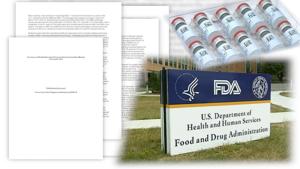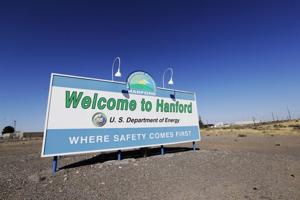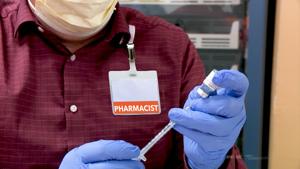WASHINGTON — Former President Barack Obama and actor Eva Longoria are joining a social media chat next week about COVID-19 vaccines and the pandemic’s effects on women, particularly women of color.
Made to Save, the United State of Women, Supermajority and the U.S. Department of Health and Human Services are hosting Monday’s event on Facebook Live.
Organizers say the event is part of a week of activity designed to address concerns among women about the vaccines and to encourage women to get vaccinated and to help others get their shots, too.
Made to Save is a national public education campaign working to build public trust in the COVID-19 vaccines. Made to Save and United State of Women are part of Civic Nation, which is chaired by Obama White House adviser Valerie Jarrett.
—-
THE VIRUS OUTBREAK:
— IOC VP: Olympics held despite state of emergency
— ‘Like hell:’ As Olympics loom, Japan health care in turmoil
— Argentina resumes strict pandemic lockdown after case surge
— Nervous workers struggle to adjust to new mask policies
———
Follow more of AP’s pandemic coverage at https://apnews.com/hub/coronavirus-pandemic and https://apnews.com/hub/coronavirus-vaccine
———
HERE’S WHAT ELSE IS HAPPENING:
ROME — American pharmaceutical company Pfizer and German company BioNTech have pledged to deliver 2 billion doses of their COVID-19 vaccine to middle- and low-income countries over the next 18 months.
The companies, which together developed the first vaccine to be authorized for use in the United States and Europe, made the announcement Friday at a global health summit in Rome co-hosted by the European Union’s executive arm and Italy.
Pfizer CEO Albert Bourla says they expect to provide a billion of the doses this year and another billion in 2022.
It was unclear whether the deliveries would take place through the U.N.-backed COVAX program, which aims to ensure equitable access to COVID-19 shots for low-and middle-income countries, or if nations would get the doses at a reduced price.
The summit is drawing the Group of 20 industrial and emerging market nations, the heads of international organizations and representatives of global health bodies.
As vaccination campaigns continue to progress in the Western world, poorer countries are struggling to acquire supplies. This week, the U.N. Security Council expressed concern about the small number of doses that have reached Africa.
———
BEIRUT — Lebanon has relaxed coronavirus restrictions as reported infections and deaths continue to decline.
The government is allowing cinemas and theaters to reopen at reduced capacity for the first time in more than a year.
A government pandemic committee recommended the relaxed measures on Friday, a day after Lebanon recorded its lowest one-day death rate in months. Only seven COVID-19 related deaths and 394 cases were reported on Thursday.
The committee also allowed organizing weddings, conferences and trade shows at reduced capacities, but urged professional syndicates to delay holding elections for another month until the downward trend is confirmed.
So far about 10 % of the nearly 6 million people living in Lebanon have received at least one vaccine since February.
The World Health Organization says the Eastern Mediterranean, which includes Lebanon, has reported a decrease in cases in the last two weeks in 17 out of 22 countries in the region.
Lebanon has registered nearly 538,000 confirmed coronavirus cases and 7,660 confirmed deaths.
———
BANGKOK, Thailand — Thailand announced its national vaccination rollout for next month and its first locally transmitted cases of the coronavirus variant discovered in India.
The government says it will begin its nationwide vaccination campaign on June 7.
An official says 15 cases of the Indian variant were found in a camp for construction workers in Bangkok. The government has banned the arrival of any non-Thais from India, Pakistan, Bangladesh and Nepal to help prevent the spread of the variant.
The government says a national state of emergency will be extended to the end of July to help contain the virus.
———
TOKYO — The IOC vice president in charge of the Tokyo Olympics says the games will open in just over two months even if the city and other parts of Japan are under a state of emergency because of rising coronavirus cases.
John Coates spoke on a virtual hookup with Tokyo organizers after three days of meetings. The Olympics are set to open on July 23. Coates says the Olympics will go on even if local medical experts advise against it.
He says advice from the World Health Organization assured him that “all of those measures that we are undertaking are satisfactory and will ensure a safe and secure games in terms of health.”
Recent public opinion polls indicate 60-80% of Japanese oppose hosting the Olympics. Coates suggested public opinion might improve as more Japanese get fully vaccinated. That figure is now about 2%.
IOC officials say they expect more than 80% of the residents of the Olympic Village, located on Tokyo Bay, to be vaccinated and largely cut off from contact with the public. About 11,000 Olympic athletes and 4,400 Paralympic athletes – who arrive in August — are expected to attend. No international fans are allowed.
———
CAIRO — Egypt has received its first shipment of raw materials necessary to begin manufacturing China’s Sinovac coronavirus vaccine.
The shipment from Beijing landed at the Cairo airport on Friday carrying raw materials to produce 2 million doses of the vaccine, according to airport officials. The plane also carried 500,000 doses of the Chinese Sinopharm vaccine.
In April, Egypt’s Holding Company for Biological Products and Vaccines (VACSERA) signed an agreement with Chinese biopharmaceutical company Sinovac to produce vaccines locally and distribute them to the rest of Africa and the Middle East.
China currently has five vaccines in use in its mass immunization campaign, three inactivated-virus vaccines from Sinovac and Sinopharm, a one-shot vaccine from CanSino, and another by Anhui Zhifei Longcom. So far, only Sinopharm has secured the World Health Organization emergency approval.
Since Egypt rolled out its vaccination program in January, which included AstraZeneca, only 1.5 million people out of a 100-million population have received the shots. So far, Egypt has received more than 2.5 million doses of the Sinopharm vaccine and over 3.3 million doses of the AstraZeneca vaccine through the global COVAX initiative, according to Health Minister Hala Zayed.
Egypt has recorded 250,000 coronavirus cases, including more than 14,5000 confirmed deaths.
———
MADRID — Spanish Prime Minister Pedro Sánchez is offering an upbeat outlook for his country’s tourism industry.
He said Friday the outlook has improved after his government lifted travel restrictions on British vacationers and the European Union moved a step closer to allowing cross-border travel.
Spain is lifting its restrictions on travelers from the United Kingdom beginning Monday.
Sánchez said those two developments will bring “a very much better summer” than last year, when the tourist industry in one of the world’s most popular vacation destinations was crushed by limits on travel and gatherings.
In 2019, some 18 million British people traveled to Spain.
———
TOKYO — Japan has expanded a coronavirus state of emergency after it approved the use of two more vaccines to help contain a surge in infections, nine weeks ahead of the scheduled opening of the Tokyo Olympics.
The government will add the Okinawa prefecture, home to most of the U.S. military forces stationed in Japan, to the state of emergency on Sunday. Although there’s no forced lockdown, the state of emergency allows prefectural governors to demand that shops and public establishments close or shorten their hours.
It has expanded from the hotspots of Osaka and Tokyo in late April to other regions this month, currently covering 42% of Japan’s population.
Japan also approved the production and use of Moderna and AstraZeneca vaccines. So far, just 4% of the population has been vaccinated using the Pfizer shots. The nation has recorded more than half of its 12,000 coronavirus deaths since February. The number in serious condition hit a record high this week.
Prime Minister Yoshihide Suga has pledged to finish vaccinating its 36 million elderly population by the end of July. Recent polls indicate more than 80% of Japanese oppose hosting the Olympics, which are scheduled to begin July 23.
———
WASHINGTON — Dr. Anthony Fauci says vaccinated Americans would “not necessarily” need to get booster shots this fall for further protection from COVID-19.
Fauci, the nation’s leading infectious disease expert, told CBS “This Morning” on Friday that scientists would be tracking data on the virus and possible variants. He says it was still “possible” an additional shot would be needed later this year to ward off possible infection.
Fauci also urged Americans to continue to follow CDC guidelines. He stressed those who haven’t been fully vaccinated still need to wear masks even if they are largely spending time with people who have been inoculated.
The doctor also says those attending indoor sporting events, like the NBA playoffs starting this week, should follow the masking policies of the arena.
———
GENEVA — The vaccines alliance Gavi has signed an agreement to buy 200 million doses of the one-shot Johnson & Johnson coronavirus vaccine in a boost to the U.N.-backed initiative to distribute vaccines to poor countries.
In a statement Friday, Gavi said the deal was made “with the goal” of the 200 million vaccines being made available this year. Earlier this week, the U.N. initiative known as COVAX suffered a major setback when its biggest supplier, the Serum Institute of India, announced it would not be exporting any more vaccines until the end of the year, in order to deal with the explosive situation on the subcontinent.
Gavi said the 200 million J&J doses would be available to both poor countries relying on vaccines, in addition to rich countries who joined COVAX as a way to guarantee themselves extra vaccine shots. Earlier this month, Canada received more then 600,000 doses of AstraZeneca from COVAX.
“As a one-dose vaccine, the J&J vaccine has particular relevance for places with difficult infrastructure,” said Gavi CEO Dr. Seth Berkley. Gavi said it is still in discussions with J&J to buy another 300 million vaccines for next year.
Still, J&J has suffered multiple production problems in the U.S. and Europe and regulators earlier paused the use of the vaccine to investigate reports of a rare blood clot. Officials concluded there were rare instances of unusual blood clots linked to the shot but that its advantages outweighed the risks.
The U.S. Food and Drug Administration shut down the production of J&J vaccines at one company in April after finding serious quality control problems.
———
MADRID — Spain is lifting its restrictions on travelers from the United Kingdom beginning Monday, saying British tourists play a key role in the Spanish economy.
Spanish authorities published the rule change in the government gazette Friday. Restrictions on travel from Japan were also lifted.
In 2019, Britain sent 18 million people to Spain, the most of any country. Tourism is a mainstay of the Spanish economy.
The rule change noted that the European Union is discussing whether to scrap limits on travel into the bloc from the U.K. and Japan, and that the change is likely to be approved.
However, a major snag remains for British tourists. Spain is on the U.K. government’s so-called amber list, meaning people traveling back to the U.K. from Spain need to go into quarantine for 10 days and get tested twice.
—-
MOSCOW — The mayor of Moscow has lamented widespread public reluctance to get coronavirus vaccines despite ample shots and strongly urged city residents to get vaccinated.
Moscow Mayor Sergei Sobyanin said Friday on his blog that just 1.3 million in the 12-million Russian capital have received the vaccine, the lowest share of immunized people compared to other European capitals.
Sobyanin noted that the pace of vaccination has slowed down even though vaccines are free and widely distributed, offered in shopping malls and city parks in addition to clinics. To speed up the immunization campaign, the city authorities even have offered cash payments to retirees who receive the vaccine.
About 10% of Russia’s 146 million residents have received the shots.
Experts have attributed the slow pace of vaccination to widespread public skepticism about vaccines and conflicting messages aired by government officials and state-controlled media, which have trumpeted successes in efforts to contain the outbreak even though the number of new infections has remained high.
Russia has registered nearly 5 million infections and almost 118,000 deaths since the start of the outbreak.
———
BUDAPEST — Hungary’s government will soon lift several COVID-19 restrictions as the number of new cases and deaths continue to plunge amid a rapid vaccination campaign.
Prime Minister Viktor Orban said Friday that an overnight curfew in place since November will be lifted once 5 million people in Hungary have received at least a first dose of a vaccine, which he predicted would happen this weekend. The wearing of masks will no longer be mandatory in public areas, and restrictions on shop hours will be eliminated, he said.
“Five million vaccinated Hungarians! This is the end of an era, which means … we have defeated the third wave,” Orban said.
The easing of restrictions comes as Hungary has vaccinated more than 55% of its population, the second highest rate in the European Union, using vaccines procured from Russia and China as well as from the EU.
Hungary had a devastating wave of the pandemic in the spring. As of Friday, 29,427 have died in the country of fewer than 10 million.
Once the 5 million threshold is reached, several other events will be permitted: group sports in public areas, private events for up to 50 people, weddings for up to 200 and open-air events of up to 500.
———
TAIPEI, Taiwan — Taiwan reported 312 new confirmed cases on Friday as part of its worst outbreak since the beginning of the pandemic.
Health Minister Chen Shih-chung says most of the cases have a clear source, but 72 of the new ones were not apparently linked to the previous infections. Chen urged the island’s residents to refrain from socializing and stay at home.
“On these two days, if everyone can reduce the flow of people to the lowest level, and if then we can gradually cut the line of transmission, it will be greatly helpful to us,” he told a daily briefing.
Taiwan raised its alert level this week, banning indoor gatherings of more than five people and outdoor gatherings of more than 10. Schools are shut for two weeks, and many are working from home.
More than 600,000 people are in quarantine.
The majority of the cases have been discovered in Taipei, the capital, and neighboring New Taipei city. Taiwan has reported an average of 200 to 300 cases in the last week alone, and has recorded a total of 3,139 confirmed cases.
———



